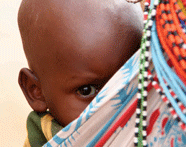Ethnopediatrics

Other cultures teach us about pregnancy, birth and babies
What we can learn: Anthropologists like Carol Worthman of Emory University have been credited with giving birth to a new field of study in recent years – ethnopediatrics (the study of childrearing practices in other cultures).
According to those involved in this emerging field, other cultures have a great deal to teach Westerners about pregnancy, birth and babies. Here are a few examples of the things we can learn from parents in other parts of the world.
Pregnancy is a life-altering experience and should be treated as such
“All over the world, pregnancy is seen as a transitional stage in life – a time of transformation,” notes Deborah Jackson in her book With Child: Wisdom and Traditions for Pregnancy, Birth, and Motherhood. “The nine months of waiting are a chance to prepare body and mind for the completely new focus of motherhood.”
Many cultures have rituals that encourage pregnant women to take a step back from everyday life and spend some time focusing on their new-found maternal status.
Fathers have an important role to play in the birth
In some cultures, fathers stand guard near the birthing hut, praying for a healthy outcome for both mother and baby; in others, they catch their own babies. Whether they’re actually present at the birth or not, they have an important role to play in welcoming their babies to the world.
The early hours after the birth are a special time for both mother and baby
Mbuti pygmi women in Zaire remain secluded with the baby for three days after the birth. And in many other cultures, new parents are routinely given time to “babymoon” with the new arrival before they’re expected to assume all their usual responsibilities.
Parents are “programmed” to want to respond to their babies’ needs
As Cornell University anthropologist Meredith F. Small notes in her book Our Babies, Ourselves: How Biology and Culture Shape The Way We Parent, “A cry means someone should do something to put the baby and its environment back into equilibrium.” According to Small, babies in non-Western cultures rarely cry. This is because their needs are met before or immediately after their first whimper.
New mothers require some nurturing themselves
According to Carroll Dunham, author of Mamatoto: A Celebration of Birth, in many parts of the world, women who are about to give birth return to their parents’ home so that they can be mothered by their own mothers during the early weeks after the birth. And in many cultures, a new mother is massaged with healing oils and pastes that are believed to help her body recover from the rigors of giving birth.
Breastfeeding is much more than a method of feeding a baby
It’s a whole way of mothering. In their book Babies Celebrated, Beatrice Fontanel and Claire d’Harcourt describe how African mothers use their breasts to nurture their babies: “The breast plays the role of nipple, toy or pacifier.” This flies in the face of long-held western ideas about infant feeding, but it’s very much in synch with what parents practicing “attachment parenting” believe.
As you can see, the developing field of ethnopediatrics is providing childrearing experts around the world with plenty of food for thought. That’s good news for both babies and their parents.
Ann Douglas is an award-winning writer and author of numerous books about pregnancy and parenting including the newly published Sleep Solutions for Your Baby, Toddler, and Preschooler and Mealtime Solutions for Your Baby, Toddler and Preschooler. Visit www.having-a-baby.com





